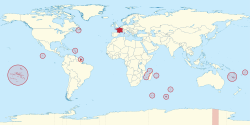မိူင်းၾရၢင်ႇသဵတ်ႈ
Appearance
မိူင်းၾရၢင်ႇသဵတ်ႈ | |
|---|---|

| |
| လႅၼ်တီႈ | |
• ႁူမ်ႈလေႃး | 640,679 km2 (247,368 sq mi) |
| 551,695 km2 (213,011 sq mi) | |
• Metropolitan France (Cadastre) | 543,940.9 km2 (210,016.8 sq mi) |
| ႁူဝ်ၼပ်ႉၵူၼ်းမိူင်း | |
• May 2020 estimate | |
• Density | 104/km2 (270/sq mi) (106th) |
• Metropolitan France, estimate as of May 2020[update] | |
• Density | 116/km2 (300.4/sq mi) (89th) |
| GDP (PPP) | 2019 estimate |
• ႁူမ်ႈလေႃး | |
• Per capita | |
| GDP (nominal) | 2019 estimate |
• ႁူမ်ႈလေႃး | |
• Per capita | |
| Gini (2018) | low inequality |
| HDI (2018) | very high |
| ပွတ်းတွၼ်ႈၶၢဝ်းယၢမ်း | UTC+1 (Central European Time) |
• ၶၢဝ်းမႆႈ (DST) | UTC+2 (Central European Summer Time[upper-roman 4]) |
| Note: various other time zones are observed in overseas France.[upper-roman 3]
| |
| ပိူင်ဝၼ်းထိ | dd/mm/yyyy (AD) |
| ပိူင်ႁေႃႈလူတ်ႉ | မိုဝ်းၶႂႃ |
| ၶူတ်ႉႁွင်ႉၽူၼ်း | +33[upper-roman 5] |
| ဢိၼ်ႇထႃႇၼႅတ်ႉ TLD | .fr[upper-roman 6] |
Source gives area of metropolitan France as 551,500 km2 (212,900 sq mi) and lists overseas regions separately, whose areas sum to 89,179 km2 (34,432 sq mi). Adding these give the total shown here for the entire French Republic. The CIA reports the total as 643,801 km2 (248,573 sq mi). | |
ၽိုၼ်ဢိင်
[မႄးထတ်း | မႄးထတ်းငဝ်ႈငႃႇ]- ↑ French National Geographic Institute data, which includes bodies of water.
- ↑ French Land Register data, which exclude lakes, ponds and glaciers larger than 1 km2 (0.386 sq mi or 247 acres) as well as the estuaries of rivers.
- ↑ Time zones across the French Republic span from UTC-10 (French Polynesia) to UTC+12 (Wallis and Futuna).
- ↑ Daylight saving time is observed in metropolitan France and Saint Pierre and Miquelon only.
- ↑ The overseas regions and collectivities form part of the French telephone numbering plan, but have their own country calling codes: Guadeloupe +590; Martinique +596; French Guiana +594, Réunion and Mayotte +262; Saint Pierre and Miquelon +508. The overseas territories are not part of the French telephone numbering plan; their country calling codes are: New Caledonia +687, French Polynesia +689; Wallis and Futuna +681.
- ↑ In addition to .fr, several other Internet TLDs are used in French overseas départements and territories: .re, .mq, .gp, .tf, .nc, .pf, .wf, .pm, .gf and .yt. France also uses .eu, shared with other members of the European Union. The .cat domain is used in Catalan-speaking territories.
- ↑ Whole of the French Republic except the overseas territories in the Pacific Ocean.
- ↑ French overseas territories in the Pacific Ocean only.
- ↑ (2012) "Table 3: Population by sex, rate of population increase, surface area and density", Demographic Yearbook. United Nations Statistics Division. Retrieved on 4 September 2017.
- ↑ "France Métropolitaine" (2011). INSEE.
- ↑ Demography – Population at the beginning of the month – France (2019).
- ↑ Demography – Population at the beginning of the month – Metropolitan France (2019).
- ↑ 5.0 5.1 5.2 5.3 World Economic Outlook Database, October 2019. International Monetary Fund.
- ↑ Gini coefficient of equivalised disposable income – EU-SILC survey. Eurostat.
- ↑ Human Development Report 2019 (PDF) (in en). United Nations Development Programme (10 December 2019). Archived from the original on 30 April 2020။ Retrieved on 10 December 2019။
